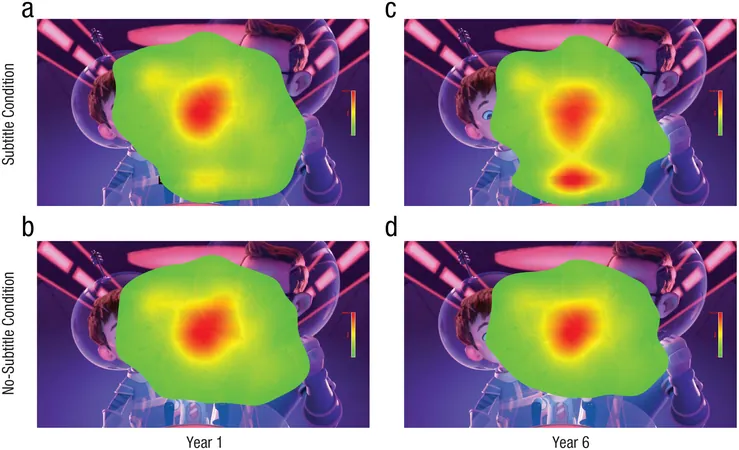
Shocking Study Reveals Subtitles May Not Boost Early Reading Skills!
2025-04-02
Author: Sarah
Introduction
In a world where public campaigns tout the power of subtitles in improving children's reading skills, new research has sent shockwaves through educational circles. Despite celebrity endorsements and political backing, a groundbreaking study has found no compelling evidence to support the idea that subtitles can significantly enhance early reading abilities among children.
The Study
Published in the prestigious journal Psychological Science, this eye-opening study monitored the eye movements of 180 primary school children, ranging from Years 1 to 6, as they watched movies both with and without subtitles. The results were surprising: the researchers discovered that young children barely paid attention to subtitles until they reached a certain level of reading fluency.
Key Findings
What does this mean? The analysis showed that only those children who could read at a pace of at least one word per second—an ability typically developed after three to four years of reading instruction—were inclined to engage with subtitles. Unfortunately, for those still struggling with reading, subtitles were effectively ignored.
Expert Opinions
Dr. Anastasiya Lopukhina, who spearheaded the research at Royal Holloway's Department of Psychology, emphasized a crucial point: "Subtitles flash by too quickly for early readers to process. If these children aren't even looking at the subtitles, it's hard to imagine how they could benefit from them." Her findings suggest that proficient reading abilities actually encourage children to watch subtitles, rather than subtitles helping to improve reading skills.
Further supporting these findings, Professor Kathleen Rastle, another researcher on the project, noted that the allure of subtitles as a quick fix for literacy fails to deliver. "The notion that watching television with subtitles can replace the rigorous journey of learning to read is misleading. Our research illustrates that obtaining reading proficiency requires comprehensive instruction and consistent practice with books."
Dr. Walter van Heuven from the University of Nottingham highlighted the importance of ongoing reading practice, stating, "While it may be true that subtitles could offer additional reading exposure after a child becomes adept at reading, we need more research to determine if they genuinely cause improvements in literacy."
Eleanor Ireland, Education Program Head at the Nuffield Foundation, underscored the relevance of these findings for parents and educators alike. "Understanding that subtitles don't benefit early readers will help guide parents toward more effective, evidence-based teaching methods like shared reading and structured reading lessons."
Conclusion
As society continues to seek innovative ways to foster literacy in children, this research urges a return to the fundamentals of reading instruction rather than relying on popular media trends. So, before you hit play on that next binge-watch with subtitles for the kids, remember: traditional reading practices might just be the secret ingredient to developing strong literacy skills!

 Brasil (PT)
Brasil (PT)
 Canada (EN)
Canada (EN)
 Chile (ES)
Chile (ES)
 Česko (CS)
Česko (CS)
 대한민국 (KO)
대한민국 (KO)
 España (ES)
España (ES)
 France (FR)
France (FR)
 Hong Kong (EN)
Hong Kong (EN)
 Italia (IT)
Italia (IT)
 日本 (JA)
日本 (JA)
 Magyarország (HU)
Magyarország (HU)
 Norge (NO)
Norge (NO)
 Polska (PL)
Polska (PL)
 Schweiz (DE)
Schweiz (DE)
 Singapore (EN)
Singapore (EN)
 Sverige (SV)
Sverige (SV)
 Suomi (FI)
Suomi (FI)
 Türkiye (TR)
Türkiye (TR)
 الإمارات العربية المتحدة (AR)
الإمارات العربية المتحدة (AR)